介词的用法总结76375
介词的用法归纳详细
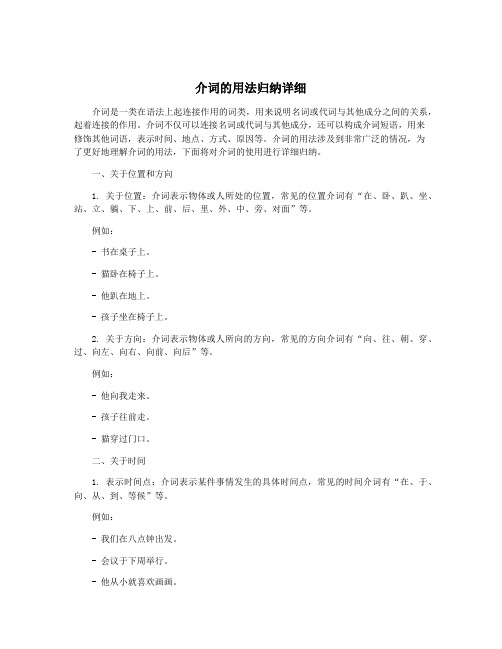
介词的用法归纳详细介词是一类在语法上起连接作用的词类,用来说明名词或代词与其他成分之间的关系,起着连接的作用。
介词不仅可以连接名词或代词与其他成分,还可以构成介词短语,用来修饰其他词语,表示时间、地点、方式、原因等。
介词的用法涉及到非常广泛的情况,为了更好地理解介词的用法,下面将对介词的使用进行详细归纳。
一、关于位置和方向1. 关于位置:介词表示物体或人所处的位置,常见的位置介词有“在、卧、趴、坐、站、立、躺、下、上、前、后、里、外、中、旁、对面”等。
例如:- 书在桌子上。
- 猫卧在椅子上。
- 他趴在地上。
- 孩子坐在椅子上。
2. 关于方向:介词表示物体或人所向的方向,常见的方向介词有“向、往、朝、穿、过、向左、向右、向前、向后”等。
例如:- 他向我走来。
- 孩子往前走。
- 猫穿过门口。
二、关于时间1. 表示时间点:介词表示某件事情发生的具体时间点,常见的时间介词有“在、于、向、从、到、等候”等。
例如:- 我们在八点钟出发。
- 会议于下周举行。
- 他从小就喜欢画画。
2. 表示时间段:介词表示某个动作或状态持续的一段时间,常见的时间段介词有“在、经过、过、自、到、等待”等。
例如:- 我们在早上九点至十二点之间上课。
- 经过几天的思考,他做出了决定。
- 我等了一个小时。
三、表达原因1. 表示原因:介词表示某个事情的原因或理由,常见的原因介词有“因为、由于、为了、关于”等。
例如:- 他因为生病而没有来上课。
- 由于下雨,他没有出去跑步。
- 我们为了庆祝活动,做了一些准备工作。
四、服务于动词1. 与动词连用:介词可以用来构成动词短语,与动词连用,表示动作的对象、方式或结果。
例如:- 我对这个问题感到困惑。
- 他们一起工作。
- 她因为生病而错过了比赛。
五、其它用法1. 表示比较:介词可以用来表示两者之间的比较,表示程度或差异。
例如:- 这个城市比那个城市发达。
- 她比我更有耐心。
2. 表示方式:介词可以表示某种方式,方法或手段。
超全英语介词用法归纳总结
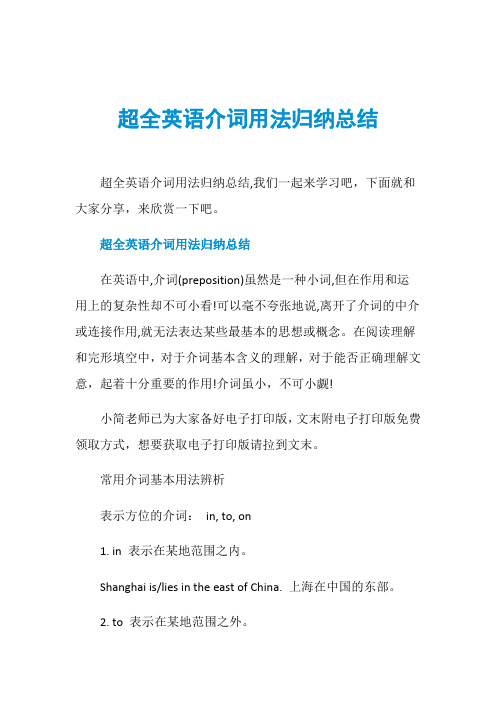
超全英语介词用法归纳总结超全英语介词用法归纳总结,我们一起来学习吧,下面就和大家分享,来欣赏一下吧。
超全英语介词用法归纳总结在英语中,介词(preposition)虽然是一种小词,但在作用和运用上的复杂性却不可小看!可以毫不夸张地说,离开了介词的中介或连接作用,就无法表达某些最基本的思想或概念。
在阅读理解和完形填空中,对于介词基本含义的理解,对于能否正确理解文意,起着十分重要的作用!介词虽小,不可小觑!小简老师已为大家备好电子打印版,文末附电子打印版免费领取方式,想要获取电子打印版请拉到文末。
常用介词基本用法辨析表示方位的介词:in, to, on1. in 表示在某地范围之内。
Shanghai is/lies in the east of China. 上海在中国的东部。
2. to 表示在某地范围之外。
Japan is/lies to the east of China. 日本位于中国的东面。
3. on 表示与某地相邻或接壤。
Mongolia is/lies on the north of China. 蒙古国位于中国北边表示计量的介词:at, for, by1. at 表示“以……速度”“以……价格”。
It flies at about 900 kilometers an hour. 它以每小时900公里的速度飞行。
I sold my car at a high price. 我以高价出售了我的汽车。
2. for 表示“用……交换,以……为代价”。
He sold his car for 500 dollars. 他以五百元把车卖了。
注意:at表示单价(price) ,for表示总钱数。
3. by 表示“以……计”,后跟度量单位。
They paid him by the month. 他们按月给他计酬。
Here eggs are sold by weight. 在这里鸡蛋是按重量卖的。
表示材料的介词:of, from, in1. of 成品仍可看出原料。
介词的用法归纳总结
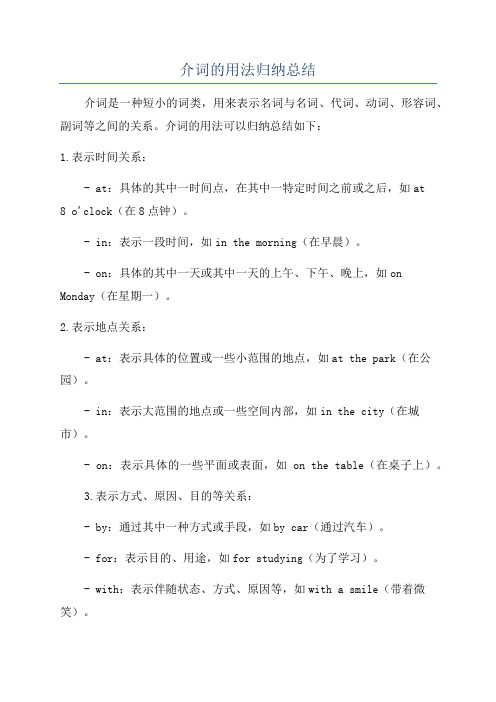
介词的用法归纳总结介词是一种短小的词类,用来表示名词与名词、代词、动词、形容词、副词等之间的关系。
介词的用法可以归纳总结如下:1.表示时间关系:- at:具体的其中一时间点,在其中一特定时间之前或之后,如at8 o'clock(在8点钟)。
- in:表示一段时间,如in the morning(在早晨)。
- on:具体的其中一天或其中一天的上午、下午、晚上,如on Monday(在星期一)。
2.表示地点关系:- at:表示具体的位置或一些小范围的地点,如at the park(在公园)。
- in:表示大范围的地点或一些空间内部,如in the city(在城市)。
- on:表示具体的一些平面或表面,如on the table(在桌子上)。
3.表示方式、原因、目的等关系:- by:通过其中一种方式或手段,如by car(通过汽车)。
- for:表示目的、用途,如for studying(为了学习)。
- with:表示伴随状态、方式、原因等,如with a smile(带着微笑)。
- about:表示关于一些话题,如talk about the movie(谈论这部电影)。
4.表示动作、状态等关系:- in:表示处在一些状态或位置,如in a hurry(匆忙)。
- on:表示进行一些动作,如put on a hat(戴上帽子)。
5.表示从属关系:- of:表示所属关系、材料、部分关系等,如the book of John (约翰的书)。
需要注意的是,介词在不同的语境中可能有不同的意义,所以具体的用法还需要具体考虑具体语境。
介词用法总结

介词用法总结介词是英语语法中一个重要的词类,用于表示名词、代词、动词和形容词等与其他词或短语之间的关系。
在不同的句子和语境中,介词具有不同的用法。
本文将对介词的用法进行总结,并提供相关的例句。
一、表示位置关系的介词1. in:在…之中,在(具体范围)。
例句:He is waiting in the car.(他正在车里等待。
)2. on:在…之上,在(水平面)。
例句:The book is on the table.(书在桌子上。
)3. at:在…地方,在(具体点)。
例句:She is studying at the library.(她在图书馆学习。
)4. by:在…旁边,靠近(某物)。
例句:He is standing by the door.(他站在门旁边。
)5. under:在…下面,在(某物)的底部。
例句:The cat is hiding under the bed.(猫在床下躲藏。
)6. between:在…之间(两者之间)。
例句:The restaurant is located between the bank and the supermarket.(这家餐厅位于银行和超市之间。
)二、表示时间关系的介词1. at:在(具体时间点)。
例句:She will meet her friend at 8 o'clock.(她将在8点钟见她的朋友。
)2. on:在(具体日期或星期)。
例句:I have a meeting on Monday.(星期一我有个会议。
)3. in:在(一段时间内)。
例句:He will travel to Europe in summer.(他将在夏天去欧洲旅行。
)4. during:在…期间,表示全程。
例句:I read a book during the flight.(我在飞行途中读了一本书。
)5. for:持续时间,表示时间段。
例句:They have been married for ten years.(他们已经结婚十年了。
完整版介词用法大全推荐文档
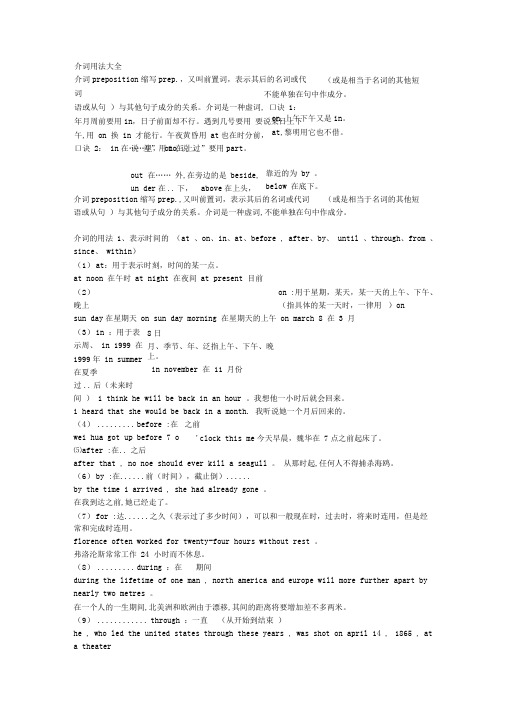
介词preposition 缩写prep.,又叫前置词,表示其后的名词或代词 (或是相当于名词的其他短 语或从句 )与其他句子成分的关系。
介词是一种虚词,不能单独在句中作成分。
介词的用法 1、表示时间的 (at 、on 、in 、at 、before , after 、by 、 until 、through 、from 、 since 、 within )(1) at :用于表示时刻,时间的某一点。
at noon 在午时 at night 在夜间 at present 目前(2)on :用于星期,某天,某一天的上午、下午、晚上 (指具体的某一天时,一律用 )onsun day 在星期天 on sun day morning 在星期天的上午 on march 8 在 3 月(3) in :用于表示周、 in 1999 在 1999年 in summer 在夏季过 .. 后(未来时间 ) i think he will be back in an hour 。
我想他一小时后就会回来。
i heard that she would be back in a month. 我听说她一个月后回来的。
(4) ......... before :在 之前wei hua got up before 7 o⑸after :在 .. 之后after that , no noe should ever kill a seagull 。
从那时起,任何人不得捕杀海鸥。
(6) by :在......前(时间),截止倒)......by the time i arrived , she had already gone 。
在我到达之前,她已经走了。
(7) for :达......之久(表示过了多少时间),可以和一般现在时,过去时,将来时连用,但是经 常和完成时连用。
florence often worked for twenty-four hours without rest 。
英语介词的用法详解及归纳
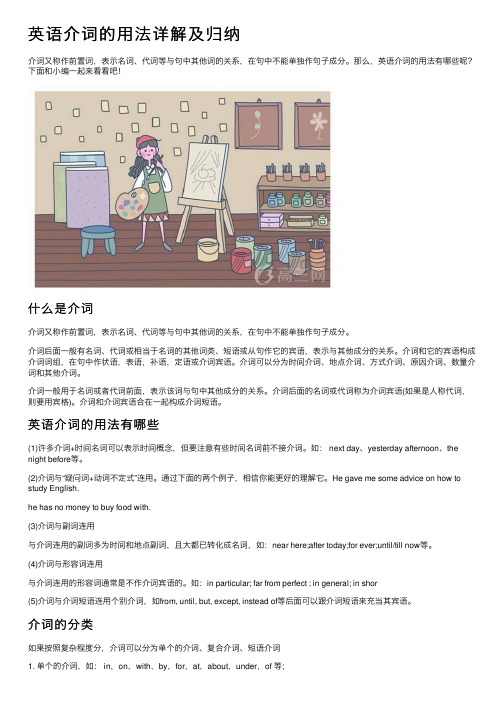
英语介词的⽤法详解及归纳介词⼜称作前置词,表⽰名词、代词等与句中其他词的关系,在句中不能单独作句⼦成分。
那么,英语介词的⽤法有哪些呢?下⾯和⼩编⼀起来看看吧!什么是介词介词⼜称作前置词,表⽰名词、代词等与句中其他词的关系,在句中不能单独作句⼦成分。
介词后⾯⼀般有名词、代词或相当于名词的其他词类、短语或从句作它的宾语,表⽰与其他成分的关系。
介词和它的宾语构成介词词组,在句中作状语,表语,补语,定语或介词宾语。
介词可以分为时间介词、地点介词、⽅式介词、原因介词、数量介词和其他介词。
介词⼀般⽤于名词或者代词前⾯,表⽰该词与句中其他成分的关系。
介词后⾯的名词或代词称为介词宾语(如果是⼈称代词,则要⽤宾格)。
介词和介词宾语合在⼀起构成介词短语。
英语介词的⽤法有哪些(1)许多介词+时间名词可以表⽰时间概念,但要注意有些时间名词前不接介词。
如: next day、yesterday afternoon、the night before等。
(2)介词与“疑问词+动词不定式”连⽤。
通过下⾯的两个例⼦,相信你能更好的理解它。
He gave me some advice on how to study English.he has no money to buy food with.(3)介词与副词连⽤与介词连⽤的副词多为时间和地点副词,且⼤都已转化成名词,如:near here;after today;for ever;until/till now等。
(4)介词与形容词连⽤与介词连⽤的形容词通常是不作介词宾语的。
如:in particular; far from perfect ; in general; in shor(5)介词与介词短语连⽤个别介词,如from, until, but, except, instead of等后⾯可以跟介词短语来充当其宾语。
介词的分类如果按照复杂程度分,介词可以分为单个的介词、复合介词、短语介词1. 单个的介词,如: in,on,with,by,for,at,about,under,of 等;2. 复合介词,例如:into,within,throughout,inside,outside,without 等;3. 短语介词,如:out of, because of, away from, on top of, ever since, next to, according to, in front of 等。
(完整word版)介词用法归纳,推荐文档
介词(preposition)又称前置词,是一种虚词。
介词不能单独做句子成分。
介词后须接宾语,介词与其宾语构成介词短语。
一、介词从其构成来看可以分为:1、简单介词(Simple prepositions)如:at ,by, for, in, from, since, through等;2、复合介词(Compound prepositions)如:onto, out of, without, towards等;3、短语介词(phrasal prepositions)如;because of, instead of, on account of, in spite of, in front of等;4、二重介词(double prepositions)如:from behind, from under, till after等;5、分词介词(participial prepositions),又可称动词介词(verbal prepositions)如:during, concerning, excepting, considering, past等。
二、常见介词的基本用法1、 about 关于Do you know something about Tom?What about this coat?(……怎么样)2、 after 在……之后I’m going to see you after supper. Tom looked after his sick mother yesterday.(照看)3、 across 横过Can you swim across the river.4、 against 反对Are you for or against me?Nothing could make me turn against my country.(背叛)5、 along 沿着We walked along the river bank.6、 before 在……之前I hope to get there before seven o’clock. It looks as though it will snow before long.(不久)7、behind 在……后面The sun is hidden behind the clouds.8、by 到……时We had learned ten English songs by the end of last term.9、during 在……期间Where are you going during the holiday. 10、except 除了Everyone except you answered the question correctly.11、for 为了The students are studying hard for the people.12、from 从I come from Shanghai.13、in 在……里 on 在……上面 under在……下面There are two balls in/on/under the desk.14、near 在……附近We live near the park.15、of ……的Do you know the name of the winner.16、over 在……正上方There is a bridge over the river.Tom goes over his English every day.(复习)17、round/around 围绕The students stand around the teacher.18、to 朝……方向Can you tell me the way to the cinema.19、towards朝着The car is traveling towards Beijing.20、with 和……一起me?Would you like to go to the cinema with学习这些介词时可以先记住它的汉语意思,然后参照例句来加深理解,并在今后的学习中加以灵活运用。
介词的用法总结
介词的用法总结介词是一种虚词,主要用来表示名词、代词和短语与其他词之间的关系。
介词后面跟的词或短语叫做介词的宾语。
介词的用法比较复杂,以下是介词用法的总结:一、表示时间、地点、方式、手段、方向、目的、原因等的介词1.表示时间的介词2.表示年、月、日、季节、世纪的时间用介词at。
例如:at 2000,atpresent,at that time,at the age of 20,at the end of the century,at the beginning of the year等。
3.表示具体某一天的早、中、晚用介词at。
例如:at 6 oclock in themorning,at noon,at midnight等。
4.表示年、月、季节的前面通常用介词in。
例如:in 1988,in July,in thespring等。
5.在节假日中用介词during和during the。
例如:during the summervacation,during Spring Festival等。
6.表示地点的介词7.表示具体地点时用介词at。
例如:at the office,at home,at school等。
8.表示方向用介词in,用介词on表示在一个表面上面。
例如:in the sky,on the ground,on a piece of paper等。
9.表示位置时用介词in和to,用介词above或over和below表示相对位置。
例如:The train is in front of the house. (火车在房子前面)The book is on the table. (书在桌子上)The window is above the bed. (窗户在床的上面)The river is below the bridge. (河水在桥的下面)等。
10.表示方式、手段的介词11.表示工具时用介词with,with后跟动词要用-ing形式作宾语补足语。
介词的用法总结归纳
介词的用法总结归纳介词的用法总结归纳一、 In介词 prep.1.(表示位置)在…里面; 在, 于; 在…部位上I could feel the tension in the room.我可以感觉到房间里的紧张气氛。
They live in France.他们住在法国。
2.(表示时间)在…时期, 在…之后, 在过程中In her twenties and thirties she had had no difficulty getting jobs.她在二三十岁时找工作一点也不困难。
I cannot see you now, e back in half an hour.我现在不能见你, 半小时后回来。
3.(表示方向)往…内, 朝…方向I saw him go in the shop.我看到他走进了商店。
4.(表示状态)处于…之中, 在…情况下Martin was in his pyjamas.马丁穿着睡衣。
They were living in terrible poverty.他们生活在极度贫困之中。
5.(表示方式)用, 以, 按, 乘, 以…形式They were speaking in Italian.他们在讲意大利语。
They went up in the lift.他们乘电梯上楼了。
6.(表示原因)由于, 为了He went in fear of his life.他为自己的性命担忧, 所以走了。
7.(表示领域, 范围)在…以内It is not in my power to do that.做那事非我力所能及。
8.(表示结果)当做, 作为What did you give him in return?你给他什么作为报答呢?9.(表示目的)为了They set off in search of the lost child.他们出发去寻找走失的孩子。
10.[表示职业、活动等]从事于,参加11.[表示数量、程度、比例]按,以;从…中12.[表示品质、能力等]在…之中;在…身上I don't think he had it in him.我认为他没这个本事。
介词的用法总结
介词的用法总结介词(Preposition)是英语中常用的词类之一,用于连接并表达名词、代词、动词或词组之间的关系。
介词在句子中起着连接、修饰或限定的作用,对句子的结构起到重要的作用。
本文将对介词的用法进行总结和归纳,以便大家更好地理解和正确使用介词。
一、介词的基本概念和作用介词的基本概念是指一种用来连接名词、代词或者词组的词类,用来表示时间、地点、方向、原因、目的、手段、方式等关系。
介词通常放在名词、代词或者词组之前,用来修饰或限定它们,从而使整个句子更准确、更具体。
二、介词的常见用法1. 表示时间:- at: 表示具体的时间点,如at 6 o'clock(在6点钟);- in: 表示较长的时间段,如in the morning(在早上);- on: 表示某一天或具体的日期,如on Monday(在星期一)、on September 1st(在9月1日)。
2. 表示地点:- in: 表示在一个大范围的地点内,如in the park(在公园里);- at: 表示在一个小范围或精确的地点,如at the cinema(在电影院);- on: 表示在某个平面上或者与表面接触,如on the table(在桌子上)。
3. 表示方向:- to: 表示朝向某个地点或目的地,如go to school(去学校);- from: 表示起始地点,如come from China(来自中国);- towards: 表示朝向某个方向,如walk towards the park(走向公园)。
4. 表示原因:- because of: 表示由于某个原因,如because of the rain(因为下雨);- due to: 表示由于某个原因,如due to the bad weather(由于天气恶劣)。
5. 表示目的:- for: 表示为了某个目的,如study for the exam(为了考试而学习);- to: 表示某个行动的目的,如go to the park(去公园)。
- 1、下载文档前请自行甄别文档内容的完整性,平台不提供额外的编辑、内容补充、找答案等附加服务。
- 2、"仅部分预览"的文档,不可在线预览部分如存在完整性等问题,可反馈申请退款(可完整预览的文档不适用该条件!)。
- 3、如文档侵犯您的权益,请联系客服反馈,我们会尽快为您处理(人工客服工作时间:9:00-18:30)。
介词的用法1.表示地点位置的介词1)at ,in, on, to,forat (1)表示在小地方; (2)表示“在……附近,旁边”in (1)表示在大地方; (2)表示“在…范围之内”。
on 表示毗邻,接壤,“在……上面”。
to 表示在……范围外,不强调是否接壤;或“到……”2)above, over, on 在……上above 指在……上方,不强调是否垂直,与below相对;over指垂直的上方,与under相对,但over与物体有一定的空间,不直接接触。
on表示某物体上面并与之接触。
The bird is flying above my head. There is a bridge over the river.He put his watch on the desk.3)below, under 在……下面under表示在…正下方below表示在……下,不一定在正下方There is a cat under the table.Please write your name below the line.4)in front [frant]of, in the front of在……前面in front of…意思是“在……前面”,指甲物在乙物之前,两者互不包括;其反义词是behind(在……的后面)。
There are some flowers in front of the house.(房子前面有些花卉。
)in the front of 意思是“在…..的前部”,即甲物在乙物的内部.反义词是at the back of…(在……范围内的后部)。
There is a blackboard in the front of our classroom.我们的教室前边有一块黑板。
Our teacher stands in the front of the classroom.我们的老师站在教室前.(老师在教室里)5)beside,behindbeside 表示在……旁边behind 表示在……后面2.表示时间的介词1)in , on,at 在……时in表示较长时间,如世纪、朝代、时代、年、季节、月及一般(非特指)的早、中、晚等。
如in the 20th century, in the 1950s, in 1989, in summer, in January, in the morning, in one’s life , in one’s thirties等。
on表示具体某一天及其早、中、晚。
如on May 1st, on Monday, on New Year’s Day, on a cold night in January, on a fine morning, on Sunday afternoon等。
at表示某一时刻或较短暂的时间,或泛指圣诞节,复活节等。
如at 3:20, at this time of year, at the beginning of, at the end of …, at the age of …, at Christmas,at night, at noon, at this moment等。
注意:在last, next, this, that, some, every 等词之前一律不用介词。
如:We meet every day.2)in, after 在……之后“in +段时间”表示将来的一段时间以后;“after+段时间”表示过去的一段时间以后;“after+将来的时间点”表示将来的某一时刻以后。
3)from, since 自从……from仅说明什么时候开始,不说明某动作或情况持续多久;since表示某动作或情况持续至说话时刻,通常与完成时连用。
since表示"自(某具体时间)以来",常用作完成时态谓语的时间状语。
since liberation(1980)自从解放(1980年)以来They have been close friends since childhood.他们从小就是好朋友。
(1)since the war是指"自从战争结束以来",若指"自从战争开始以来",须说"since the beginning of the war"。
(2)不要将since与after混淆。
比较:He has worked here since 1965.(指一段时间,强调时间段)自从1965年以来,他一直在这儿工作。
He began to work here after 1965.(指一点时间,强调时间点)从1965年以后,他开始在这儿工作。
4)after, behind 在……之后after主要用于表示时间;behind主要用于表示位置。
时间名词前介词用法口诀年前周前要用in 具体日子要用on 遇到几号也用on 上午下午得是in要说某日上下午用on换in记清楚午夜黄昏用at 黎明用它也不错at用在时分前说“差”可要用上to 说"过''要用past3.表示运动方向的介词:across, through 通过,穿过across表示横过,即从物体表面通过,与on有关,为二维through穿过,即从物体内部穿过,与in有关,为三维。
4.表示“在……之间”的介词:表示“在……之间”的介词在英语中属于方位介词,如in front of ,behind ,on,in,near,under,upbetween, amongbetween指在两个人或两个事物之间;among指在三个或三个以上的人或事物之间。
5.表示其他意义的介词1)on ,about 关于on 表示这本书,这篇文章或演说是严肃的,或学术性的,可供专门研究这一问题的人阅读;about表示内容较为普通,不那么正式。
2)by, with, in 表示方法、手段、工具by 以……方法、手段或泛指某种交通工具;with 表示用…工具、手段,一般接具体的工具和手段;in 表示用…方式,用…语言(语调、笔墨、颜色)等;3)except, besides 除了except 除……之外,不包括在内;besides 除……之外,包括在内。
Except for Mr. Wang, we went to see the film.(王先生没去)Besides Mr. Wang, we also went to see the film.(王先生也去了)其它常用介词介词在英语词汇中所占比例很小,但它们的用法却非常灵活,复杂。
下列为常用介词及含义:1)about 关于,附近,大约,周围,随身.I have bought a book about Shakespearean.我买了一本有关莎士比亚的书。
There are about fifteen trees in the picture.大约有十五棵树在图片里。
2)above 在....上,高出,以上,超过,在...上游.The plane is flying above the clouds.飞机在云上飞行。
I think the man is above sixty years old.我想那人有六十多岁了。
3)across 横过,对面,交叉,在...的对面.Can you swim across the river?你能游过河吗?We live across the street.我们住在街的对面。
4)after 在...后面,依照.He went home after school.他放学后就回家了。
Read after me, please.请跟我朗读。
5)against 撞到,靠着,反对,违背,The car hit against the tree.汽车撞了树。
He is standing against the wall.他靠墙站着。
6)along 沿着,顺着.They are walking along the river.他们沿着河行走。
7)among 在...当中.(三者或三者以上)He is the tallest among them.他是他们当中个子最高的。
8)around 在...的周围,在...那一边.They sat around the table talking the news.他们绕桌而坐谈论新闻。
There is a drugstore around the corner.拐角处有一家药店。
9)as 作为.He doesn't like people treat him as a child.他不喜欢人们把他当小孩子对待。
10)at 在...时刻,在...点钟,在...岁时, 向,在...之中,按...速度,值(卖)...钱, 在...(强调地点)He always gets up at six in the morning.他时常早上六点钟起床。
He shot at the bird but missed it.他向鸟射击,但是没射中。
The car goes at eighty miles an hour.汽车以每小时八十公里的速度行驶。
11)before 在...的前面(位置),在...之前(时间)He took a picture before the car.他在汽车前照了张照片。
He can't finish his work before supper.晚饭前他完不成工作。
12)behind 在...的后面(位置), 落后于,不如4)after 在...后面,依照,Are there any brooms behind the door.门后有扫帚吗?All of us are behind him in mathematics.我们数学都不如他。
13)below 在...之下,低于,There are four lights below the ceiling.天花板下面有四盏灯。
The murderer run away below the police's eyes.杀人犯从警察眼皮底下跑了。
14)beside 在...的旁边,在...之外,与...相比.He found the body beside the river.他在河边发现了尸体。
Beside yours,my computer is too slow.与你的计算机速度相比,我的就慢多了。
15)besides 除...之外, 还有...We are all here besides Bowe.除鲍外,我们也都来了。
